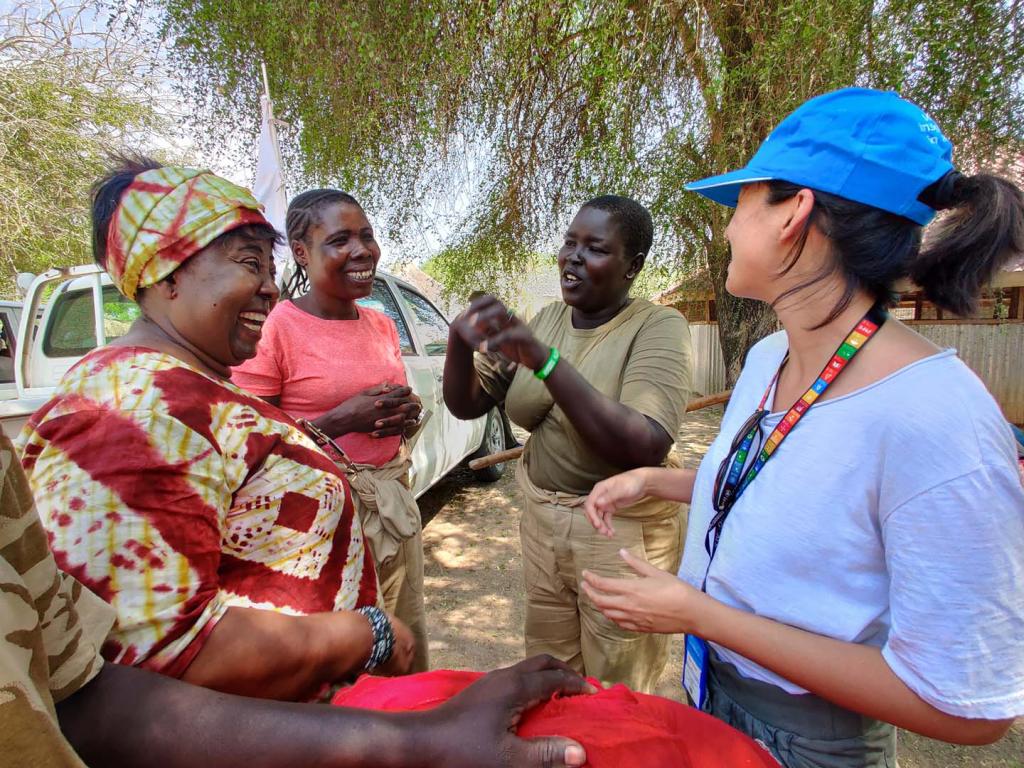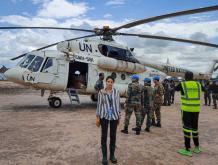Rhea Mahanta (India) serves with the United Nations Mission in South Sudan (UNMISS) as a UN Volunteer Civil Affairs Officer. On the occasion of the International Day of Peace, Rhea shares with us some reflections on her work in pursuit of peace in South Sudan in the below interview.
What does volunteering mean to you?
Volunteering stems from respect and reverence for life itself. Our quality of life is contingent upon the kind of society we create and promote, and volunteerism is that vital link between the individual and society. Compassion and empathy are the fundamental basis for these links because they break boundaries between self and others.
I started volunteering at a young age with grassroots organizations in India, and in 2019, I was extremely fortunate to join the UN Volunteers (UNV) programme and got an opportunity to work towards building durable peace in South Sudan, with communities and experiences vividly different from my own.
Volunteering has always been a constant source of strength in my life, and my UN Volunteer assignment has helped me expand my worldview and build essential life skills.
I have come to understand that volunteering for the UN is not just a professional assignment, but is integral to building the kind of world that we collectively envision.
Thanks to the flexibility of the UNV programme, I am a formal volunteer for peace but continue to be an informal volunteer in my personal capacity for climate action and refugee rights - which I think the causes are interrelated.
Understanding the essence of volunteerism has changed the way I think about life and inspired me to serve with the UN - an organization that is uniquely positioned to address issues at multiple levels in a coherent, coordinated and sustainable manner. --Rhea Mahanta, UN Volunteer Civil Affairs Officer
As a UN Volunteer in South Sudan, what does your work entail?
As a UN Volunteer serving at the UNMISS Bor field office, I work in the Civil Affairs Division (CAD), which is one of the key civilian components of the peacekeeping mission acting as a nexus between the mission, local communities and authorities.
Under a Protection of Civilians mandate to build durable peace, my role is to facilitate and promote conflict management, reconciliation, and social cohesion among communities in Jonglei State and Greater Pibor Administrative Area, which is my area of responsibility.
In addition, we support the implementation of South Sudan's Revitalized Peace Agreement to promote ownership of the peace process at the subnational and local levels.
As a gender focal point in the Bor Field Office, I also work to ensure gender sensitivity and gender inclusion in our programming.

Do you interact with local communities?
Yes, I do. On a daily basis, I interact with various segments of civil society in my area of responsibility. These include state and local authorities, civil society organizations, faith-based groups, community leaders, elders, traditional chiefs, women and youth leaders, and academia, among others. I closely collaborate with them to monitor conflict dynamics for early warning and conflict prevention and support a peaceful resolution of conflicts.
How is your work contributing to the pursuit of peace in South Sudan?
One of the challenges in working for peace is measuring the impact of our work, because a conflict prevented often goes unrecorded. But I have seen how our peace and reconciliation efforts have incrementally helped transform relationships over time.
Our support to local peace initiatives has on several occasions helped de-escalate tensions or strengthen reconciliation between clans and communities. More importantly, capacity-building efforts for local actors have helped build national ownership of peace processes and empowered local populations to peacefully manage and resolve their disputes, which is vital for sustainable and durable peace in South Sudan.
Confidence-building measures have helped build trust between various parties to conflicts. Communities that used to fight each other are now able to protect each other from intercommunal violence. Peace is slowly but surely happening in South Sudan.
As a gender focal point, how do you integrate women's meaningful participation in peace processes?
When we talk about creating the conditions necessary for peace, it has become clear that peace in South Sudan will not be built without women.
As a gender equality advocate for the Jonglei and the Greater Pibor Administrative Area (GPAA), my work entails clearly articulating key messages on the need for women's inclusion in decision-making at all levels.
As Susan Sesay – my colleague and Gender Affairs Officer at UNMISS Bor Field Office – often says, "Women's participation in the reconstruction of South Sudan is a fundamental requisite to peace and security in the country."

Rhea is not just a Gender Focal Point, but a gender equality champion for the Jonglei and the Greater Pibor Administrative Area (GPAA). She exhibits this anytime she goes on an integrated patrol with the message on the need for women to be included in decision-making at all levels. --Susan Sesay, Gender Affairs Officer at UNMISS Bor Field Office
What have been your most significant challenges and lessons?
Due to the nature of a multidimensional mission with various civilian, military and police components, we often face challenges that are new and unique to the environment. However, working with colleagues and populations with different cultures and outlooks can be exciting at the same time. The experience has pushed me to improve my understanding of planning and coordination skills and values like respect for diversity.
Similarly, living in a controlled environment away from family with limited resources can be another challenge. However, I value the lessons of self-reliance that come with it, and at the same time, the inter-dependence of living in a community where colleagues are both close friends and neighbors.
On the other hand, COVID-19 presented new challenges to our work. As CAD, our jobs require regular interaction with communities. However, with COVID-19 restrictions and preventive measures, the nature of that interaction had to change. For example, we had to be mindful of the number of participants in our forums; or in some cases, shift our engagements to virtual spaces instead of in-person. We also carried out programmatic activities for community sensitization on COVID-19. The situation is slowly returning to normal with preventive measures in place and increased awareness among the community members and households.
Lastly, field life can be physically and mentally demanding, especially when we go on long patrols; but those are the challenges that I most look forward to because experiencing the settings and conditions that the people of South Sudan have to live in really puts things in perspective and humanizes the work that we do.
I deeply value our excursions to the field, to remote villages and communities. The simplicity in interacting with communities under a tree is the experience that I will cherish for life.
Rhea was recently recognized by the Sector Commander of UNMISS Sector East with a Certificate of Appreciation in recognition of meritorious and valuable service whilst assigned to UNMISS.

